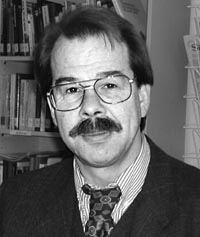Language Courses for the Whole Family

“We launch projects and programs for ethnic Germans residing in Ukraine (the latest census data suggest a figure of 33,300). Primarily, these are language courses. We aim to give each ethnic German an opportunity to take almost free courses in German. Another aspect of our activity has to do with culture. We invite music and dance ensembles. It also involves work with children. This month we are holding a workshop for journalists writing for German language newspapers. Two of them are published in Ukraine, namely, Jugendwelt [world of the young] and Zentrale deutsche Zeitung [central German newspaper].”
“Are there any youth exchange programs between our countries?”
“There certainly are. Cultural exchange is one of our priorities. In February, we sent a group of Ukrainians to Germany and invited a group of Germans to visit Odesa this summer. We organize similar outings three times a year.”
“Are only ethnic Germans eligible to participate?”
“Most definitely. And they must have a good command of German. Currently, a number of young people are pursuing their higher education in Germany.”
“Does this have anything to do with professional exchange?”
“We are talking here of teacher exchange, that is, those coming here are primarily concerned with teaching German. They are either students or graduates of teacher colleges.”
“Is the program roughly the same throughout the CIS?”
“Some minor differences are possible, but it is the same in principle. Significantly, some 700,000 ethnic Germans live in Russia and 300,000 in Kazakhstan. They are scattered virtually all across the former Soviet Union. They can be even found in Poland.”
“Are these programs designed to stem the flow of immigrants?”
“Above all else we aim to support people who live here so that they do not feel isolated. But if they cannot wait to move to Germany they should at least learn some German beforehand. Incidentally, a bill is under consideration in Germany that if signed into law would make language examinations mandatory for the whole family. Therefore, we expect attendance to increase at our German courses.”
“Could you comment on the phenomenon of the recent wave of migration, that is, segregation of Ukrainians and Russians from the German community. They speak their native language, go to their own discotheques, and do not even try to assimilate into the German community, often freeloading on unemployment benefits.”
“We did not give adequate consideration to this problem before. First of all, people are taking up German residence who do not speak German. Second, these people lack the skills needed to work in Germany and, therefore, can be employed only as drivers or work on farms. However, a mere 3% of Germans are employed in agriculture. There is a shortage of specialists, say, in computer technologies, IT, and so forth. What is more, our jobless rate has hit four million, which is a major problem. Unemployed foreigners find it much harder to scrape by than native Germans.”
“What can you say about Ukraine’s national minorities policy?”
“Thus far, I haven’t seen Germans being treated unfairly. They do not hide their national identity. Nobody prevents them from speaking their native language. Schooling is the only problem, as Germans are too few to open separate schools for them. Cooperation with Ukraine in this sphere is not bad at all.”
“Ukraine is hardly ever covered in the Deutsche Welle programs broadcast locally. Is this evidence that we are on the sidelines of Germany’s interests?”
“Unfortunately, Germans know very little about Ukraine. While the Klychko brothers are well known, Ukraine remains a mystery. Thus the goal of the Goethe Institute is not only to bring German culture here, but also disseminate the culture of other countries in Germany.”






